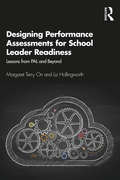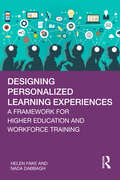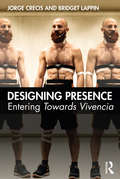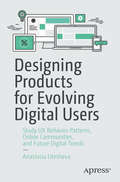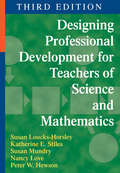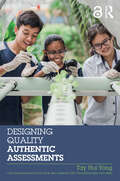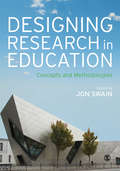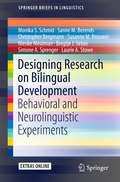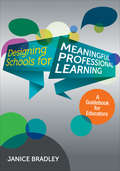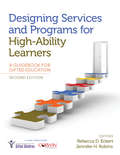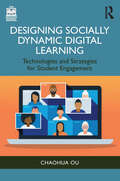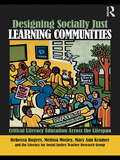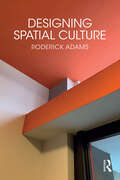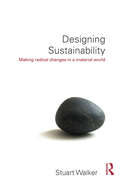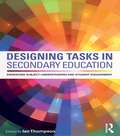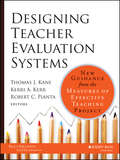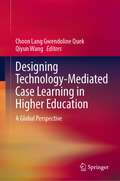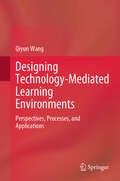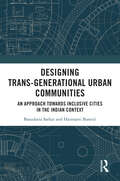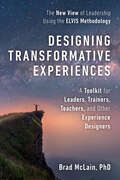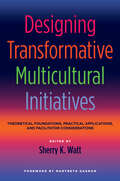- Table View
- List View
Designing Performance Assessments for School Leader Readiness: Lessons from PAL and Beyond
by Margaret Terry Orr Liz HollingworthIn face of increased scrutiny on the preparation of educational leaders, this book provides a much-needed resource, exploring the role and use of authentic performance assessment for evaluating leader readiness and performance. Framed by theory and research on school leader performance assessment, Designing Performance Assessments for School Leader Readiness provides an in-depth description of one fully tested performance assessment called the Performance Assessment for School Leaders (PAL). The authors explore how to assess four components of leadership proficiency -- developing a plan for an area of school improvement, creating a professional learning culture among school staff, supporting individual teacher development, and engaging families and community in improving student learning. This book provides real examples and practical guidance on designing and managing performance assessment for aspiring educational leaders, and how the PAL can be used in regional, state and local contexts.
Designing Personalized Learning Experiences: A Framework for Higher Education and Workforce Training
by Nada Dabbagh Helen FakeDesigning Personalized Learning Experiences offers theoretically grounded and pragmatic approaches to designing personalized learning initiatives for higher education and organizational contexts. With current research concluding that a multitude of variables can enable learners to direct their own experiences and achieve their goals, new guidance is needed to hone the range of instructional approaches, activities, and interactions available to support adult learners. This book offers practical strategies on how to design and implement effective personalized learning interventions, advance learning and engagement, encourage ownership over the learning process, and decrease attrition. Professionals in instructional design, learning and development, organizational development, consultancies, and beyond will be emboldened by the work to leverage a mix of technology-enabled social and content interactions.
Designing Presence: Entering Towards Vivencia
by Jorge Crecis Bridget LappinDesigning Presence offers a unique insight into the training that has helped people around the world to cultivate more presence in both professional and personal settings. It explains the research behind the method of Towards Vivencia, shares stories of how it has been implemented and offers practical exercises to apply it in any context. Presence is something that is often talked about but is difficult to pin down. We have all experienced moments when we felt one with what we are doing and with our environment. However, this feeling is usually fleeting and we don’t know when or how we will experience it again. Towards Vivencia is the first methodology of its kind to train performers to locate and replicate that specific state of consciousness associated with presence and peak performance. Based on over 20 years of experience, combined with research in anthropology, philosophy and the latest advances in neuroscience, Towards Vivencia enables performers to become fully engaged with their experience in order to operate at their highest possible level. This book aims to equip readers with the ability to actively design their experiences and create lasting changes not only in how they approach performance but also how they approach their everyday lives.
Designing Products for Evolving Digital Users: Study UX Behavior Patterns, Online Communities, and Future Digital Trends
by Anastasia UteshevaDigital user behavior is evolving at an ever-increasing pace, and predicting future trends is a booming business as a result. Users associate technology with their identities now more than ever, and it is up to you as a product designer to enhance their experience for the better. Designing Products for Evolving Digital Users is a 21st century handbook that helps you do just that. By providing insights that allow you to study UX (user experience) behavior patterns, online communities, and future digital trends, Designing Products for Evolving Digital Users instills confidence and fact-based foundations for your digital creations. Author Anastasia Utesheva expertly teaches you how to account for the way the technology impacts the identity of users and how that identity shifts through ongoing interaction with a product or service. She also brings in important case studies on social media, gaming, eRetail, and more to illustrate past examples of technology’s profound impact on communal and individual identity. Digital product design’s ultimate end goal is end user satisfaction. While a myriad of material is available out there consisting of simple tips and tricks for optimal digital design, Designing Products for Evolving Digital Users is a rare and remarkable title that cohesively accounts for all environmental factors involved. Comprehend how distributed technology impacts creation and negotiation of identity and explore communities that form around digital products. UX designers, futurists, students, and industry veterans alike have an abundance of invaluable learning ahead of them in Designing Products for Evolving Digital Users. What You Will LearnLearn how to design digital products/services that resonate with and transform identity of usersStudy how digital impacts formation of identityConsider how digital technology has impacted our world and implications for future digital trendsWho This Book Is For UX designers, digital product creators, entrepreneurs, educators, philosophy of technology enthusiasts, futurists
Designing Professional Development for Teachers of Science and Mathematics
by Susan Loucks-Horsley Katherine E. Stiles Ms Susan E. Mundry Nancy B. Love Professor Peter W. HewsonThe classic guide for designing robust science and mathematics professional development programs! This expanded edition of one of the most widely cited resources in the field of professional development for mathematics and science educators demonstrates how to design professional development experiences for teachers that lead to improved student learning. Presenting an updated professional development (PD) planning framework, the third edition of the bestseller reflects recent research on PD design, underscores how beliefs and local factors can influence PD design, illustrates a wide range of PD strategies, and emphasizes the importance of: Continuous program monitoring Combining strategies to address diverse needs Building cultures that sustain learning
Designing Quality Authentic Assessments (Assessment in Schools: Principles in Practice)
by Tay Hui YongThis book examines the principles and practice of authentic assessment. It seeks to answer the following questions. What is authentic assessment? How is authentic assessment different from 'performance assessment' or 'alternative assessment'? How can authentic assessment support learner-centred education, especially when a performance-oriented culture favours pen-and-paper examinations? The book is structured into two major parts. The first, 'Principles of authentic assessment design', provides readers with a conceptual explanation of authenticity; the principles for designing quality authentic assessments for valid evidence of student learning; and guidance about how to develop quality rubrics to structure assessment tasks. The second part of the book, 'Theory into practice' provides examples developed by teachers to demonstrate an understanding of authentic assessment. The subject areas covered include humanities, languages, mathematics, sciences, character and citizenship. Two case studies are discussed to demonstrate how authentic assessment can be used to comprehensively address key learning objectives in a variety of curriculum contexts. This book provides practitioners with concrete examples on how to develop authentic assessment to suit their context and also enhance their students’ learning. The book will also enable teachers to face assessment challenges present in our changing world.
Designing Research in Education: Concepts and Methodologies
by Jon SwainThis is a clear introduction to the methodological and philosophical debates in the field of education research. It sets out the key ideas, questions, and dilemmas which inform all research and then, through the careful use of case studies and practical advice from experienced researchers, grounds them in the specific concerns of education and educational studies. Written by experienced academics and teachers the book links broad philosophical principles with practical strategies for designing and conducting ethical and effective research. Perfect for postgraduate students planning their own research in education this book will help you to: · Understand the philosophical foundations of your work. · Conceptualise and refine your research question. · Pick the right methodology for your research. · Embed ethical considerations throughout your research. This book is an ideal companion for any postgraduate student or early career academic conducting research across education and educational studies.
Designing Research on Bilingual Development
by Monika S. Schmid Sanne M. Berends Christopher Bergmann Susanne M. Brouwer Nienke Meulman Bregtje J. Seton Simone A. Sprenger Laurie A. StoweThis volume offers an in-depth description and discussion of research design for a large-scale investigation of bilingual development. It introduces and justifies a range of theoretical and methodological innovations, discusses some of the problems that come with these and proposes practical solutions. The present volume introduces a research design intended to capture a wide range of linguistic data, elicited by means of behavioral tasks, neuroimageing data and free speech from both second language learners and first language attriters of two languages (Dutch and German) representing a wide range of language combinations and ages of onset. Gathering and analyzing such a range of data comes with a multiplicity of problems, many of them linked to the fact that similar tests have to be designed across a range of languages and measurements will have to occur in various locations. The current volume presents a research design appropriate to these questions, discussing the methodological challenges of such a study. It offers advice on how to construct experimental materials which are parallel across different languages set up a protocol for additional measures which can be applied across a wide range of participants combine data from different labs when using different ERP equipment and different eyetrackers.
Designing Schools for Meaningful Professional Learning: A Guidebook for Educators
by Janice T. BradleyEmpower your teachers as partners in professional learning—and see student achievement soar! Are you ready for a professional learning program that makes a lasting difference in the quality of teaching within your school or district? Janice Bradley, a highly-respected educator shows how to promote your faculty’s professional growth and accountability through job-embedded learning. This breakthrough book enables education leaders to Work collaboratively with faculty to develop and implement a five-part plan for professional learning designed to meet your school’s unique needs Connect professional learning with practices that have the greatest positive effect in the classroom Link professional development to teacher evaluation in a manner that builds trust Learn best practices from schools that implemented Bradley’s methodology, and benefit from user-friendly strategies and tools Say goodbye to top-down programming that’s quickly forgotten, and discover an approach that empowers and inspires your faculty at all levels of experience. "It′s hard to imagine a simple, five-step process that could integrate all of Learning Forward′s seven professional learning standards, yet that is exactly what Janice Bradley has done in the book, Designing Schools for Meaningful Professional Learning." —Patricia Roy, Senior Consultant Learning Forward Center for Results "I’ve never experienced professional learning such as this! Taking part in collaborative learning with my team gave me the opportunity to explore questions and curiosities about my students that have been buried in years of district-driven professional development. Now my colleagues and I research together in order to create a learning environment every child deserves." —Kathryn Million, First-Grade Dual Language Teacher Las Cruces, NM
Designing Schools for Meaningful Professional Learning: A Guidebook for Educators
by Janice T. BradleyEmpower your teachers as partners in professional learning—and see student achievement soar! Are you ready for a professional learning program that makes a lasting difference in the quality of teaching within your school or district? Janice Bradley, a highly-respected educator shows how to promote your faculty’s professional growth and accountability through job-embedded learning. This breakthrough book enables education leaders to Work collaboratively with faculty to develop and implement a five-part plan for professional learning designed to meet your school’s unique needs Connect professional learning with practices that have the greatest positive effect in the classroom Link professional development to teacher evaluation in a manner that builds trust Learn best practices from schools that implemented Bradley’s methodology, and benefit from user-friendly strategies and tools Say goodbye to top-down programming that’s quickly forgotten, and discover an approach that empowers and inspires your faculty at all levels of experience. "It′s hard to imagine a simple, five-step process that could integrate all of Learning Forward′s seven professional learning standards, yet that is exactly what Janice Bradley has done in the book, Designing Schools for Meaningful Professional Learning." —Patricia Roy, Senior Consultant Learning Forward Center for Results "I’ve never experienced professional learning such as this! Taking part in collaborative learning with my team gave me the opportunity to explore questions and curiosities about my students that have been buried in years of district-driven professional development. Now my colleagues and I research together in order to create a learning environment every child deserves." —Kathryn Million, First-Grade Dual Language Teacher Las Cruces, NM
Designing Services and Programs for High-Ability Learners: A Guidebook for Gifted Education
by Rebecca D. Eckert Jennifer H. RobinsThe updated, comprehensive guide to developing or enhancing gifted programming With new perspectives based on recent research and the updated National Association for Gifted Children Programming Standards, this second edition of Designing Services and Programs for High-Ability Learners provides educators with the comprehensive, practical advice they need to support today’s gifted learners. Written by leading experts, each chapter focuses on a key feature of high-quality gifted programs and takes into account current educational trends, such as the Focus on diversity to ensure underrepresented populations are screened for gifted education Collaboration with special education to ensure students with disabilities have access to programming Use of technology Development of local policies to support gifted education
Designing Services and Programs for High-Ability Learners: A Guidebook for Gifted Education
by Rebecca D. Eckert Jennifer H. RobinsThe updated, comprehensive guide to developing or enhancing gifted programming With new perspectives based on recent research and the updated National Association for Gifted Children Programming Standards, this second edition of Designing Services and Programs for High-Ability Learners provides educators with the comprehensive, practical advice they need to support today’s gifted learners. Written by leading experts, each chapter focuses on a key feature of high-quality gifted programs and takes into account current educational trends, such as the Focus on diversity to ensure underrepresented populations are screened for gifted education Collaboration with special education to ensure students with disabilities have access to programming Use of technology Development of local policies to support gifted education
Designing Socially Dynamic Digital Learning: Technologies and Strategies for Student Engagement
by Chaohua OuDesigning Socially Dynamic Digital Learning is a practical guide to the creation of online and blended coursework and learning environments that foster social interaction and engagement among students. Regardless of format, enrollees in higher education need active, collaborative, and social experiences to thrive, though new guidance is needed to help faculty and administrators integrate digital tools and develop courses toward this goal. This book introduces state-of-the-art learning technologies and evidence-based pedagogical strategies that can be seamlessly adopted and adapted across disciplines. Instructors, learning designers, consultants, and educational technology trainers, developers, and directors will find a wealth of fresh insights and best practices as they select, apply, and incentivize digital technologies for social-forward yet outcomes-driven learning experiences.
Designing Socially Just Learning Communities: Critical Literacy Education across the Lifespan
by Rebecca Rogers Mary Ann Kramer Melissa Mosley The Literacy for Social Justice Teacher Research GroupDemonstrating the power and potential of educators working together to use literacy practices that make changes in people's lives, this collaboratively written book blends the voices of participants in a teacher-led professional development group to provide a truly lifespan perspective on designing critical literacy practices. It joins these educators’ stories with the history and practices of the group - K-12 classroom teachers, adult educators, university professors, and community activists who have worked together since 2001 to better understand the relationship between literacy and social justice. Exploring issues such as gender equity, linguistic diversity, civil rights and freedom and war, the book showcases teachers’ reflective practice in action and offers insight into the possibilities and struggles of teaching literacy through a framework of social justice. Designing Socially Just Learning Communities models an innovative form of professional development for educators and researchers who are seeking ways to transform educational practices. The teachers' practices and actions – in their classrooms and as members of the teacher research group – will speak loudly to policy-makers, researchers, and activists who wish to work alongside them.
Designing Spatial Culture
by Roderick AdamsDesigning Spatial Culture investigates a powerful experiential dialogue formed between the habitation of space and a diversified cultural realm. This creative proposition binds and positions human activity and experience framing its histories, currency and future. Whilst the book distinguishes between the conditions of the existing urban/ architecture/ interior canon, it embraces a new agency of space, showcasing the encounters, assemblies and designs that shape human behaviours and the cultural forms of the built environment. Using authoritative case studies, the book examines many locations and spaces, ranging from new urban landscapes, historical domestic spaces and contemporary architecture. It embraces the most lavish and flamboyant to the most simplistic and minimal, establishing a connected cultural narrative. The book shifts the focus in the spatial realm from an object-based experience (where space is filled with things) to a more complete immersive experience (combining physical and digital). A key part of this exploration is the relationship between the architecture and the interior which is often the most predominant spatial experience and fundamental to the understanding spatial experience and existing cultures. Without the architectural enclosure, the interior would lose its site context and structure for its existence. Without an interior, architecture would not fully develop an engaging spatial experience for the user. The book rationalises this through extended use of a spatial probe which documents and summarises an evidence-based research project capturing spatial culture data from a predominantly domestic setting. The book is essential reading for students and researchers in architecture, interior design and urban design.
Designing Sustainability: Making radical changes in a material world
by Stuart WalkerWhat is the relationship between design, sustainability, inner values and spirituality? How can we create designs that provide a convincing alternative to unsustainable interpretations of progress, growth, consumerism and commercialism? Building on the arguments first advanced in his widely acclaimed books Sustainable by Design and The Spirit of Design, Stuart Walker explains how we can achieve the systemic changes needed to address the challenges of sustainability. Challenging common assumptions about the nature of our contemporary material culture and its relationship to human flourishing, the author introduces approaches to design that draw inspiration from nature, summon the human imagination and create outcomes which are environmentally responsible and socially just, as well as meaningful and enriching at a personal level. Offering a unique and original contribution to this vital debate, Designing Sustainability is destined to become essential reading for students on courses in design and sustainability and for design practitioners looking for a deeper, more meaningful basis for their work.
Designing Tasks in Secondary Education: Enhancing subject understanding and student engagement
by Ian ThompsonEngaging students in learning about their subject is a central concern for all teachers and teacher educators. How teachers view and use the pedagogic potential of different tasks to engage pupils with knowledge in different subjects, is central to this endeavour. Designing Tasks in Secondary Education explores models for effective task design, helping you translate the curriculum into the tasks and activities that you ask your students to do in order to facilitate developmental or higher-level understanding of curriculum content. Written by experts in the field of education from a range of subjects and including a foreword written by renowned author Professor Walter Doyle, this book spans an international context and offers a refreshing alternative of how to plan and design tasks that will not only intellectually stimulate but improve teaching quality. Key topics explored include: Designing tasks which engage learners with knowledge Policy perspectives on task design Designing cognitively demanding classroom tasks Task design issues in the secondary subjects Designing Tasks in Secondary Education offers essential insight into task design and its importance for enhancing subject understanding and student engagement. It will challenge and support all education professionals concerned with issues of curriculum design, subject knowledge, classroom organisation, agency in the learning process and teaching quality.
Designing Teacher Evaluation Systems
by Thomas Kane Robert Pianta Kerri KerrDefinitive research for meaningful teacher evaluationsAll across America, in urban, suburban, and rural schools, teacher evaluation procedures are much-debated. Evaluation processes for teachers have varied over the years, and the usefulness of those processes to improve and assess the quality of a teacher's instruction has been questionable and often non-existent. Designing Teacher Evaluation Systems, New Guidance from the Measures of Effective Teaching Project provides you with original research from an extensive study that will help you rethink and redesign teacher evaluation procedures.Using the MET data set, Designing Teacher Evaluation Systems addresses the top questions of practitioners who are involved in designing reliable and useful teacher evaluations. Former teacher assessments were not effective in identifying poor performers from good performers. This book offers you new guidance to build evaluation programs that will fairly and accurately evaluate teaching practices employed by your instructors. It will also:Share information from some of the leading thinkers in K-12 educationCover over three years of definitive research in the field of teacher evaluationHelp you develop and employ effective evaluation processesInstruct and guide future leaders in educationFilled with a rich supply of valuable information from MET researchers around the country, Designing Teacher Evaluation Systems is a thorough collection that equips you to devise and implement a teacher evaluation procedure that will enhance your teachers' performance and improve your students' achievement levels. This book shows how teacher evaluations can become meaningful assessments used to bolster educational excellence for teachers and students.
Designing Technology-Mediated Case Learning in Higher Education: A Global Perspective
by Choon Lang Gwendoline Quek Qiyun WangThis book collects case studies in design and application of technology-mediated case-based learning models in higher education. It provides a much-needed, updated synthesis of recent research and application of technology-mediated case-based learning across disciplines within higher education. The book does not only provide a broad perspective and deep understanding on the designs and instructional applications of technology-mediated case-based learning models, but also inspire more interest in adopting or inventing new situated case-based learning models in the context of higher education.
Designing Technology-Mediated Learning Environments: Perspectives, Processes, and Applications
by Qiyun WangThis book helps teacher designers better understand the roles of technology in education, the key design perspectives of a technology-mediated learning environment (TMLE), the design considerations for each perspective, and the design processes of a TMLE. This book presents a generic conceptual framework, called Pedagogical, Social and Technical design (PST), to illustrate the main design perspectives of the TMLE and their relationship. It also describes a pragmatic design approach, the educational design research approach, for teacher designers to easily follow when they are designing TMLEs. This book also demonstrates two application examples using the PST framework as a design tool to design a blended synchronous learning environment and as an analytical tool to evaluate the educational affordances of an information and communication technology tool.
Designing Trans-Generational Urban Communities: An Approach towards Inclusive Cities in the Indian Context
by Basudatta Sarkar Haimanti BanerjiThis book examines the inclusiveness of city planning and design to address gaps in policies, strategies and design guidelines for developing trans-generational urban communities in India. Identifying key factors and measurable indicators of trans-generational cities within social, physical, and economic dimensions, the volume highlights the need for establishing age-friendly and child-friendly cities and communities. Through a systematic process of ground data collection, the book explores issues related to health, daily routine, lifestyle, recreation, and socialization within vulnerable groups, considering their physical and cognitive limitations for framing adaptable policies. The volume integrates a bottom-up and top-down approach by integrating the needs and perception of the target group obtained from extensive groundwork with the available theories and literature in allied fields adopting a step-by step synchronized methodology. It also presents the way forward for framing policies focusing on socio-economic security, participation, dignity, care, and self-fulfillment.Offering rich empirical research, this book will be useful for students, teachers and researchers of architecture, urban design, urban geography, urban studies, urban development and planning, and child psychology. It will also be of interest to urban planners and designers, policy planners, local government authorities and professionals engaged in the discipline.
Designing Transformative Experiences: A Toolkit for Leaders, Trainers, Teachers, and other Experience Designers
by Brad McLainOffering a new lens on leadership and living, this research-based guide shows how to design experiences that can touch hearts, provoke minds, and change lives in powerful ways.Transformative experiences are life events that change our sense of self in important ways. How do they work? What elements do they require? How can we learn to design them intentionally?By embracing the research-based approach of ELVIS (the Experiential Learning Variables and Indicators System), this book details how to recast yourself as an Experience Design Leader, one that can provide those in your organization with the opportunities needed to reflect and grow as individuals.Beginning with the ELVIS Framework, you will gain deep foundational insight into how transformative experiences work. And then with the ELVIS Toolkit, which includes seven practical design elements, you will have the key to unlocking these powerful experiences for yourself and others.Whether you are new to the idea of designing experiences for others or are a seasoned veteran, ELVIS shows you how to tap into the psychology operating behind the most powerful and important experiences of our lives-those that shape who we are.
Designing Transformative Multicultural Initiatives: Theoretical Foundations, Practical Applications, and Facilitator Considerations
by Marybeth GasmanHigher education is facing a perfect storm as it contends with changing demographics, shrinking budgets and concerns about access and cost, while underrepresented groups – both in faculty ranks and students – are voicing dissatisfaction with campus climate and demanding changes to structural inequities.This book argues that, to address the inexorable changes ahead, colleges and universities need both to centralize the value of diversity and inclusion and employ a set of strategies that are enacted at all levels of their institutions. It argues that individual and institutional change efforts can only be achieved by implementing “diversity as a value” – that is embracing social change efforts as central and additive rather than episodic and required – and provides the research and theoretical frameworks to support this approach, as well as tools and examples of practice that accomplish change.The contributors to this book identify the elements that drive successful multicultural initiatives and that strengthen the effectiveness of campus efforts to dismantle systemic oppression, as well as the individual and organization skills needed to manage difference effectively. Among these is developing the capacity of administrators, faculty and student affairs professionals as conscious scholar practitioners to sensitively manage conflicts on campus, deconstruct challenging structures and reconstruct the environment intentionally to include in respectful ways experiences of historically marginalized groups and non-dominant ways of being in the world. The books’ focus on developing capacities for multicultural competence aligns with higher education’s increasing emphasis on civic engagement and institutional goals promote skills to interact in meaningful and responsible ways around difference, whether of people, ideas or identities.Designing Transformative Multicultural Initiatives provides guiding principles and practical strategies to successfully transform higher education to become fully inclusive and advance the success of all constituents and stakeholders.
Designing Video and Multimedia for Open and Flexible Learning (Open and Flexible Learning Series)
by Jack KoumiThis is a comprehensive, practical guide to the most effective use of video and multimedia in open and distance learning. Illustrated throughout, it considers pedagogic design principles for the highest quality learning material, covering: what to teach on video and how to teach it when to choose and how to use other media for teaching a framework of pedagogic design principles for video and multimedia practical development advice for interactive multimedia. With insights into the comprehensive process of designing, developing and managing distance learning materials, this book will appeal to those involved in course development, educational video, audiovision and interactive multimedia design, as well as to students of general video and multimedia production.
Designing With Color: Concepts And Applications
by J. R. Watson Chris DoroszThis textbook/workbook trains students' eyes to develop a visual understanding of color and the principles of design through guided observation and engaging activities. Lavishly illustrated with full-color graphics and photos, the book demonstrates how color and other design elements are combined in nature and the visual arts. Part One presents color, the most immediately noticeable element of design. Part Two integrates color with the other design elements and shows how they interact according to the principles of design. Students can apply their learning by completing a series of activities and record their work with photos for future reference.
